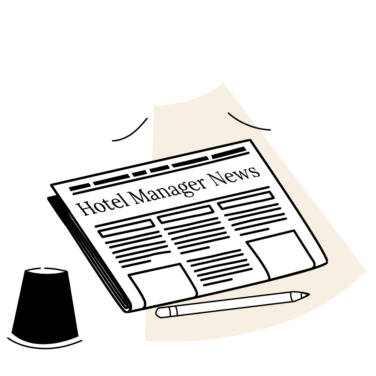Picture this: Your hotel revenue isn't just making a comeback; it's “cha-chaing” straight to the top floor.
Let's all wave goodbye to the pandemic travel drama because, guess what? The horizon ahead is looking bright.
Since global travel dusted off its suitcase and made a triumphant return in 2023, we're not just talking about bouncing back; we're talking about embracing new revenue peaks.
But let's keep it real – we're not here to watch your revenue do a little bounce back. No, no. We're here to set you up with 17 practical strategies that go beyond bouncing back. It's time to strap in and discover how to ride this wave of opportunity, boosting your hotel's revenue like a pro.
So, buckle up, because we're about to dive into the keys to success in the ever-changing world of hotel revenue optimization
1. Leverage Data Analytics
Taking advantage of your analytics is important. It's about knowing what your guests want and tailoring your Hotel marketing plan accordingly.
Data analytics will be helpful in guiding pricing strategies, predicting demand, and helping with personalized marketing. It's not just about looking back; it's about using real-time data to refine your approach and stay ahead.
While going through the analytics you will gain a wealth of knowledge including; knowing what guests prefer, finding new market opportunities, and figuring out where you can run things more efficiently. But the real deal will be strategy refinement.
With data analytics, you're tweaking marketing, fine-tuning pricing, and making guest experiences better.
2. Leverage Food and Beverage Options
The Rise of On-Demand Services:
The emergence of on-demand food delivery services, along with in-room dining, has given hotels new avenues to enhance the food and beverage experience.
Hotel Guests can order food or beverages to their room whenever they want, rather than being limited to designated dining hours. We all know the frustration of arriving late to a hotel, and the food services in the hotel being closed.
With a push for on-demand services guests can order their favorite dishes from the comfort of their rooms, making the dining experience more convenient and enjoyable.
We saw this happen years ago when Door Dash partnered with Wyndham Resorts & Hotels. This is a great example when a hotel can partner with popular delivery platforms, hotels can tap into a broader customer base, and boost customer satisfaction.
Benefits of Digital Menus:
Digital menus are the modern answer to traditional paper menus, and I think many restaurants saw this benefit when it was forced on them during the pandemic.
The digital menus also offer a more interactive dining experience, allowing guests to browse through enticing images, detailed descriptions, and real-time prices.
By leveraging digital menus, hotels can make it easier for guests to explore their culinary offerings and place orders efficiently. Digital menus also offer opportunities for upselling and promoting high-margin items, thereby increasing the average check value.
Revenue Implications:
The revenue implications are significant. Hotels can capture a larger share of the food and beverage market by adapting to the digital dining landscape.
The convenience of on-demand services and the appeal of digital menus lead to increased guest satisfaction, which, in turn, drives repeat business and positive reviews.
This, coupled with efficient upselling, results in higher revenue and profitability for the hotel.
3. Pre-Arrival Room Upgrades
Pre-arrival upgrades can be extremely helpful in boosting hotel revenues for a few straightforward reasons.
First off, it's about seizing the moment of anticipation. When guests receive the option to upgrade their room a few days before they check in, it taps into their excitement. Now, they're not just booking a room; they're investing in an experience.
The best time to really get to know your guests is before they show up at your hotel. It's all about trying to figure out about them as much as you can right from the booking stage. Are they a business traveller, or a family on leisure?
Catching them in this sweet spot significantly increases the likelihood of them saying, "Yes, I want that upgrade!"
On the hotel's side, it's a direct revenue boost. The cost of the upgrade is outweighed by the additional revenue generated, and it's not just a one-time gain. Satisfied guests are more likely to become repeat customers and recommend the hotel to others, creating a ripple effect of increased bookings.
If you can understand what services they're grabbing and why they're on the trip, you're set to tailor your offer to fit their needs.
From there, shoot them some emails that match their vibe, offering up services they'd likely jump on.That way, when you try to upsell, it's more likely to hit the mark.
4. Collaborate with Local Businesses
We all love an impressive hotel room and a lobby, right? But really, when it comes down to it, often the true value lies in curating exceptional guest experiences.
A great way to help with this is to cultivate partnerships with local businesses in your area, whether it be the charming café down the street or the local tour operator. By embracing a great working relationship – your support benefits them, and vice versa.
What forms can these partnerships take?
Consider affiliations with restaurants to offer exclusive guest discounts, partnerships with nearby attractions for compelling package deals, or affiliations with spas for comprehensive relaxation packages.
Including revenue-sharing isn't just about the “fine print” of a partnership, it's about making fair deals. Take teaming up with a local bakery, for example. They supply the breakfast pastries, and both of you share in the profits. It's not just about the numbers; it's about making sure everyone benefits, including the guest!
Beyond financial considerations, prioritize the augmentation of guest experiences by acquainting them with popular local attractions. When your hotel guests discover the beauty and excitement of your neighbourhood, their loyalty is not just earned; it becomes a sustained commitment!
5. Utilize Other Upsell Opportunities
Now, let's talk about unlocking some extra revenue through strategic upselling opportunities! Hotels have various upsell opportunities that can enhance the guest experience while boosting revenue. Here are some common upsell opportunities in a hotel:
- Room Upgrades: Offer guests the option to upgrade their room to a higher category with additional amenities or a better view.
- Early Check-In/Late Check-Out: Provide flexibility with check-in and check-out times for an additional fee.
- Parking Upgrades: Offer premium parking options, such as valet service or convenient spots close to the entrance.
- Wi-Fi Packages: Provide different levels of internet speed or premium Wi-Fi access for a fee.
- Breakfast Packages: Offer guests the option to include breakfast with their reservation or upgrade to a more extensive breakfast buffet.
- Spa Packages: If the hotel has a spa, upsell spa services or packages for relaxation and pampering.
- Pet-Friendly Services: Charge a fee for allowing pets in the room and provide pet amenities or services.
- Late-Night Room Service: Extend room service hours or offer a late-night menu for an additional charge.
- Welcome Amenities: Provide guests with a welcome package, such as a bottle of wine, chocolates, or fruit baskets, for an extra fee.
- Local Experiences: Offer guided tours, tickets to local attractions, or special partnerships with nearby businesses.
- Event Packages: If the hotel hosts events, offer packages that include meeting room upgrades, catering options, or audio-visual enhancements.
- Fitness and Wellness Packages: Provide access to the hotel's fitness center, wellness classes, or in-room exercise equipment for a fee.
A lot of these common upsell opportunities can be low-hanging fruit for your hotel. Consider the convenience factor for your guests. What traveler would not say yes to hassle free parking or the chance to take their beloved pet on their trip?
When it comes to communication channels for upselling, use the digital marketing streams by leveraging pre-stay emails, website banners, and even check-in conversations to subtly introduce these add-ons.
The impact on revenue is noteworthy; even small fees, although incremental revenue, can add up when multiplied by the number of guests.
It's not just about the bottom line; it's about enhancing the guest experience by offering personalized services they might not have considered. These simple upsells can be an easy lucrative win for your hotel.
6. Incentivize Staff for Upselling
Your hotel employees really do play a pivotal role in the success of upselling strategies, which is why it will be so important to keep them motivated. Implementing a reward system can be a game-changer. By acknowledging and incentivizing staff for successful upsells, you not only boost their morale and job satisfaction but also cultivate a culture of proactive engagement.
The effectiveness of a reward system lies in their ability to align their individual efforts with overall business goals. It's not just about immediate financial gains; it's an investment in the long-term success of the hotel.
Motivated teams provide better service, leading to satisfied guests who are more likely to return and recommend. This creates a cycle of increased loyalty and sustained revenue growth.
Additionally, a content and stable workforce within your hotel reduces turnover costs and builds a culture of proactive service. In essence, investing in your hotel employee motivation for upselling isn't just about short-term gains; it's a strategic move for long-term financial success.
7. Focus on Online Reviews
In today's digital landscape, guests heavily rely on reviews to gauge the quality of a hotel's services and overall guest experience. Positive reviews can be a powerful digital marketing tool, where these recommendations can build trust and credibility.
Technology solutions such as reputation management tools can help hotels actively monitor and respond to reviews across various platforms, ensuring timely engagement with guests. These tools also provide valuable insights into areas for improvement.
The correlation between positive online reviews and revenue is undeniable – favorable feedback attracts more bookings, leading to increased occupancy rates and, consequently, higher revenue. Hotels that prioritize and actively manage their online reputation are not only enhancing their visibility but also laying the groundwork for sustained financial success in the highly competitive hospitality industry.
Here are just a few notable technology solutions that can assist your Hotel in improving their online reviews and managing their online reputation effectively.
Reputation Management Software:
Tools like ReviewPro, Revinate, or TrustYou allow hotels to monitor reviews from various online platforms in one central dashboard. These tools often provide analytics, sentiment analysis, and the ability to respond directly to reviews.
Guest Feedback Surveys
Platforms like Medallia, GuestRevu, or SurveyMonkey enable hotels to collect direct feedback from guests. This proactive approach allows hotels to address concerns before they become negative online reviews.
Social Listening Tools
Tools such as Brandwatch or Mention help hotels track mentions of their brand on social media and other online platforms. This allows them to respond promptly to both positive and negative comments.
8. Seasonal and Off-Peak Promotions
Embracing the ebb and flow of high season and low season is key to maximizing revenue for your hotel. Understanding the dynamics of seasonal and off-peak periods allows you as the Hotel Manger to proactively counteract potential downturns.
Crafting special promotions tailored to these periods can be a game-changer. Whether it's enticing package deals, exclusive discounts, or bundled amenities, these targeted promotions will attract your guests during traditionally slower times and low seasons.
Remember that your goal isn't just to fill rooms but to do so without compromising on value.
By offering unique experiences or additional perks during off-peak periods, your Hotel will not only maintain revenue streams but also create memorable stays that encourage guest loyalty. This can be a strategic approach to managing your Hotel business fluctuations, ensuring a steady income and bolstering your hotel's resilience in the face of seasonal challenges.
9. Target Specific Guest Demographics
Understanding your target market can really unlock that full potential of increasing Hotel Revenues. IIdentifying key demographics of your hotel guests allows you to tailor your marketing strategies.
By recognizing the unique preferences, behaviors, and needs of specific guest segments, you can craft personalized experiences that resonate with your guests..
This even goes beyond generic promotions; it's about creating targeted campaigns that speak directly to the interests of your guests.. The result is not just increased bookings but improved conversion rates.
Tailoring marketing efforts to match the desires of your specific guest groups enhances the relevance of your promotional content, increasing the likelihood of converting inquiries into reservations.
Targeting specific demographics is a strategic pathway to optimizing conversion rates and maximizing the overall effectiveness of your hotel's marketing initiatives.
10. Optimize Your Online Presence
Online touchpoints, such as your website and social media, are a major part of influencing a guest's decisions.
Robust digital marketing , SEO (search engine optimization) and content strategies are essential for making it easy for your hotel to be discovered, making your hotel website visible to those who are actively seeking accommodations.
Incorporating relevant keywords and creating engaging content enhances your search engine ranking, attracting organic traffic and establishing your hotel as a trustworthy choice.
The emphasis here isn't just on attracting guests but on targeting the right ones. Crafting digital content that resonates with your ideal audience ensures that you draw in guests whose preferences align with what your hotel uniquely offers. This approach leads to higher conversion rates and sustained business growth.
11. Implement Dynamic Pricing
Dynamic pricing is a creative way to boost hotel revenue by tweaking room rates based on real-time demand and market changes. Instead of sticking to fixed prices, dynamic pricing lets your hotel adapt to shifts in demand, local events, and seasonal trends. The key is evaluating current booking patterns, competitor rates, and market trends in real-time.
This data-driven approach helps hotels optimize revenue, especially during busy periods. The challenge is finding the right balance – maximizing earnings without putting off guests. Using insights from data, hotels can implement dynamic pricing that's both strategic and fair, offering competitive rates while ensuring guests get real value.
It's a savvy strategy that not only adjusts to market shifts but also amps up revenue and keeps guests happy.
12. Charge for Early Check-In and Late Checkout
Charging guests for early check-in and late checkout is a strategy that can make a substantial impact. This concept involves offering guests the option to check in early or check out late for a fee.
Why is this important?
It not only maximizes the utilization of your hotel rooms but also provides an added level of flexibility to guests, catering to their needs!
This strategy holds significant revenue potential. By allowing guests to access their rooms before standard check-in time or stay longer than the usual checkout time, you can create an additional stream of revenue.
Data shows that implementing this strategy can help your hotel revenue management while enhancing guest satisfaction. According to Canary Technologies the numbers reveal that guests are happy to pay between $20 and $50 for the convenience.
In fact, some hotels have harnessed this option to generate over $30,000 annually in additional revenue. Guests appreciate the flexibility, and hotels can optimize their room inventory, leading to a win-win situation.
To make it work, providing transparent pricing, communicating the option clearly during the booking process, and ensuring seamless guest experiences are essential implementation tips that can help hotels maximize the revenue potential of this strategy.
Early Check-In Pricing Model:
- Standard Rate: Early check-in from 2:00 PM onwards is included in the room rate.
- Tier 1: Early check-in from 12:00 PM to 2:00 PM: $20 fee.
- Tier 2: Early check-in from 10:00 AM to 12:00 PM: $40 fee.
- Tier 3: Early check-in before 10:00 AM: $60 fee.
Late Checkout Pricing Model:
- Standard Rate: Late checkout until 1:00 PM is included in the room rate.
- Tier 1: Late checkout from 1:00 PM to 3:00 PM: $20 fee.
- Tier 2: Late checkout from 3:00 PM to 5:00 PM: $40 fee.
- Tier 3: Late checkout after 5:00 PM: $60 fee.
13. Implement a Loyalty Program
If your Hotel does not have a loyalty program, this could be a huge game changer for you. The importance of customer retention cannot be overstated, and a loyalty program really is a great tactic in fostering lasting connections with your guests.
Loyalty programs in the hotel industry come in various shapes, from points-based systems to tiered memberships. Each type aims to create a sense of exclusivity and reward for returning guests.
Points programs let guests accumulate rewards with each stay, while tiered memberships offer escalating benefits for those who frequent the establishment regularly. The revenue implications can be quite profound – loyal customers tend to spend more, refer friends, and become brand ambassadors.
In the grand revenue scheme, a well-crafted loyalty program isn't just a gesture of appreciation; it's a strategic investment in the sustained success of your hotel, bringing back happy guests again and again!
14. Leverage Social Media Marketing
When it comes to marketing your Hotel these days, using social media isn't a nice-to-have; it's a must. Social media today is a great way to interact with people, chat with potential guests, and build a solid fan base, and solidify relationships with your faithful guests.
Doing social media right means more than just throwing up nice pictures; it's about telling your story, being real, and creating a digital community that clicks with your crowd.
For effective social media campaigns, mix things up with engaging and exciting content, smart posting times, and interactive stuff that pulls guests into the chat. Whether it's showing off your hotel's cool quirks, running fun contests, or teaming up with social media influencers, the aim is to get people talking beyond the screen.
Now, let's talk about money. A killer social media game isn't just about getting likes; it's about driving real bookings. Your exciting content catches eyes, gets folks checking out your place, and, boom, they're booking a stay! Plus, it's a handy way to up your customer service game, keeping guests happy and loyal.
Social media here isn't just about getting “likes” once in a while, it really is a great opportunity, that if you navigate smartly, can seriously pump up your hotel's revenue!
15. Optimize Group and Event Sales
Group bookings and events can be a great way for your hotel to tap into some extra revenue if you are not already doing that. It's not just individual guests but entire groups of people, translating into a substantial revenue stream.
To attract group business, strategic approaches include tailoring packages that cater to the specific needs of different groups, offering flexible booking terms, and providing unique event spaces or perks.
Building relationships with event planners, engaging in targeted marketing, and showcasing your hotel's capabilities can also make a significant impact.
The revenue potential from optimized group and event sales goes beyond the immediate booking. It encompasses additional spending on accommodation, dining, spa treatments, room service. Moreover, the positive experiences from successful events can lead to future bookings and recommendations, creating a ripple effect that continues to boost your hotel's revenue.
16. Streamline Operational Efficiency
The link between operational efficiency and revenue is pretty direct. When operations run well, it turns into enhanced guest satisfaction, shorter turnaround times, and efficient resource allocation.
This, in turn, frees up your hotel employees to focus on delivering exceptional guest experiences rather than dealing with operational hiccups, which no one wants to deal with.
Technology solutions play a pivotal role in operational optimization. From automated check-in systems to robust property management software, these tools streamline tasks, minimize errors, and improve overall efficiency.
This not only saves time but also contributes to a more seamless and enjoyable guest experience.
By investing in a smart hotel revenue management solution and refining operational processes, hotels not only cut unnecessary expenses but also create a solid foundation for elevated guest satisfaction which in turn helps to then increase revenue!
17. Diversify Revenue Streams
While room bookings are a cornerstone, smart hoteliers know that relying solely on them is like putting all your eggs in one basket. This is why thinking beyond the beds is an essential part of getting creative with other modes of revenue.
Consider adding a spa package to your offerings. Throw in gym memberships, enticing both guests and locals in your area to come join. Or maybe you can embrace the co-working trend by transforming unused spaces into vibrant work hubs, attracting remote workers and local professionals.
The benefits of revenue diversification really does extend beyond that immediate income spike. By getting creative and tapping into different revenue streams, you not only insulate your hotel from economic fluctuations but also create a more resilient and adaptive business model.
A spa, gym, or co-working space doesn't just generate revenue; it fosters guest loyalty, attracts a diverse clientele, and positions your hotel as a multifaceted destination. It's about turning your hotel into a community hub, ensuring that, whether guests come for a stay, a workout, or a workday, your revenue potential keeps expanding.
Here are some other quick ideas you may want to consider for your hotel:
Restaurant and Catering Services: Operating on-site restaurants, cafes, or offering catering services for events and functions can be a lucrative source of revenue.
Event Spaces and Banquets: Renting out event spaces for weddings, conferences, and other gatherings can generate substantial income.
Online Merchandise Sales: If your hotel has a distinct brand or theme, consider selling branded merchandise online or at the hotel, such as clothing, accessories, or specialty products.
Exclusive Memberships: Offer exclusive memberships that provide perks like access to amenities, discounts on services, and priority booking.
Transportation Services: Provide shuttle services, car rentals, or partner with local transportation services to offer convenience to guests.
Tour and Excursion Packages: Collaborate with local tour operators to offer curated tour packages, allowing guests to explore the destination.
Corporate Partnerships: Form partnerships with local businesses for mutual promotions, discounts, or joint events that benefit both the hotel and its partners.
Educational Workshops and Classes: Host workshops, classes, or seminars on topics related to the hotel's theme or location.
Pet-Friendly Amenities: Cater to pet owners by offering pet-friendly rooms, pet-sitting services, or partnering with local pet businesses.
Digital Services: Provide premium Wi-Fi services, virtual events, or digital concierge services for guests who prefer digital experiences.
What’s Your Next Move?
As I have already mentioned, In this ever-evolving world of hospitality, mastering the art of revenue generation requires a multifaceted approach.
The key thing to remember though is that it’s important to implement these strategies with a holistic mindset. It's not just about rooms; it's about crafting unforgettable experiences for your guests, and building lasting connections which in turn can help your hotel begin to increase in revenues.
Now is the perfect moment to jump into this, customize it to fit your distinct hotel brand, and witness each strategy lay the foundation for your hotels future!
If you would like to do further reading and expand on these strategies, here is a great list of hotel revenue management books for you to continue to dig through!
Want to elevate your professional edge in hospitality & hotel management overall? Subscribe to our newsletter for a curated blend of expert advice, industry news, and success secrets!




